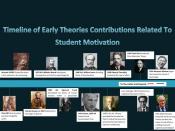Readiness to Learn � PAGE �1�
Readiness
Learning is inherent to everyone, but why do some people choose to learn at different times than others? Maturity and motivation provide the catalyst for a person's readiness to learn. Each person's maturity level depends upon his or her individual uniqueness according to life's experiences, personal preferences, and situation. However, motivation can be more easily identified and labeled. This motivation is what triggers a person to take advantage of a learning opportunity when presented. Combined with maturity, motivation enables a person to succeed in their educational endeavors. Where does this motivation come from, and why does it provide the pivotal element in the decision to pursue learning? One of Knowles assumptions states "as a person matures his readiness to learn becomes oriented increasingly to the developmental tasks of his social roles" Smith, 1999). These social tasks in many cases also provide the backbone for motivation.
The following text will discuss how maturity and motivation affect "readiness to learn," and how educators can utilize these attributes to instruct adult learners.
Maturity
Adult learners normally bring a great deal of maturity, which is a product of self-confidence, self-awareness, and increased problem-solving skills (Newman & Peile, 2002). These factors combined with a multitude of independent social factors lead to a person's maturity. This maturity allows them to cope more effectively in real life situations including the pursuit of educational goals. This individual quality must be recognized and reinforced by educators, which will enhance learning by identifying the proper timing for instruction (Lieb, 1991). An additional facet correlated with maturity is individualism, and individualism aids educators in constructing personal learning plans and assessments for future educational needs (Newman & Peile, 2002).
Motivation
Motivation provides reasons for an adult to pursue learning. This motivation is important to educators...


